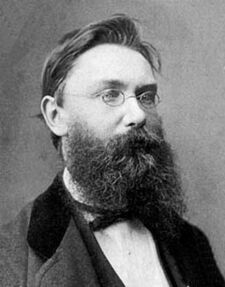Alfred Clebsch facts for kids
Quick facts for kids
Alfred Clebsch
|
|
|---|---|

Rudolf Friedrich Alfred Clebsch
|
|
| Born | 19 January 1833 |
| Died | 7 November 1872 (aged 39) |
| Nationality | Prussian |
| Alma mater | University of Königsberg |
| Known for | Clebsch graph Clebsch representation Clebsch surface Clebsch–Gordan coefficients Legendre–Clebsch condition |
| Awards | Prix Poncelet (1868) |
| Scientific career | |
| Fields | Mathematics |
| Doctoral advisor | Franz Ernst Neumann |
| Doctoral students | Gottlob Frege Alexander von Brill |
Rudolf Friedrich Alfred Clebsch (born January 19, 1833 – died November 7, 1872) was an important German mathematician. He made big discoveries in areas of math called algebraic geometry and invariant theory. These fields help us understand shapes and patterns using algebra.
Alfred Clebsch studied at the University of Königsberg. Later, he taught at the University of Berlin and the University of Karlsruhe.
Working with Paul Gordan
Clebsch worked with another mathematician named Paul Gordan in Giessen. Together, they created something called Clebsch–Gordan coefficients. These are special numbers that are now used a lot in quantum mechanics. Quantum mechanics is the part of physics that studies how tiny particles, like atoms, behave.
Founding a Math Journal
In 1868, Alfred Clebsch teamed up with Carl Neumann at the University of Göttingen. They started a very important math magazine called Mathematische Annalen. This magazine is where mathematicians share their new discoveries and research.
Understanding Elasticity
Clebsch also did work on elasticity. This is the study of how solid objects can stretch, bend, and then return to their original shape. Years after his death, in 1883, a French scientist named Saint-Venant translated Clebsch's work on elasticity into French. It was published as Théorie de l'élasticité des Corps Solides.
See also
 In Spanish: Alfred Clebsch para niños
In Spanish: Alfred Clebsch para niños
- Clebsch graph
- Clebsch representation
- Clebsch surface
- Eigenvalues and eigenvectors
- Helmholtz equation
- Hyperboloid model
- Pentagram map
- Quaternary cubic
 | Madam C. J. Walker |
 | Janet Emerson Bashen |
 | Annie Turnbo Malone |
 | Maggie L. Walker |

